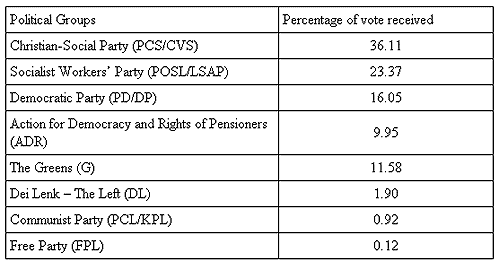Results
News
Corinne Deloy,
Fondation Robert Schuman,
Megan Maley
-

Available versions :
EN

Corinne Deloy
Fondation Robert Schuman
Megan Maley
In an unsurprising victory, the Christian-Social Party (PCS/CVS) formed by Prime Minister Jean Claude Juncker handily won the legislative elections that took place on June 13th. He received 36.11% of the vote, almost 6 points higher than his score in the 1999 election. Only 5 years ago, the Christian-Social Party received one of their worst electoral scores ever. This time, however, the opposition group, the Social-Democrats of the Socialist Workers Party (POSL/LSAP), came in second with an electoral score of 23.37% - just slightly lower than their last legislative showings.
The Democratic Party (PD/DP), led by the Minister of Foreign affairs, Lydie Polfer, was the overall loser of the election. The liberal party lost 6 points, receiving 16.05% of the vote. The Green Party (G) gained 4 points and secured a new seat in the eastern region with the election of Henri Knox. The party Action for Democracy and Rights for Pensioners (ADR) remained stable (-0.6 point). Dei Leink/The Left (DL), however, saw their results from the 1999 legislative elections halved, as they received only 1.9% of the vote. The Communist Party (PCL/KPL) only ran candidates in two circumscriptions (South and Center), and likewise only received 0.92% of the vote. Finally, the Free Party (FPL), which only ran one candidate in the North, came away with 0.12% of the vote.
The Prime Minister, who has been the head of the government since 1995 and a member of the governmental cabinet since 1982, was extremely involved in this year's electoral campaign which took place the same day as the European Elections. Juncker assembled thousands of people together for 8 large rallies called "Juncker on Tour."
"I did not win these elections alone. This is a victory for all Luxembourgeois and partisans. This victory is a confirmation that we have done a good job with our government," Juncker declared at his victory celebration. The fear that certain voters would vote differently, believing the election to be already won by the Christian-Social Party, proved to be unmerited. The Prime Minister celebrated the equally successful results of his party in the European Parliamentary elections, where they received 37.15% of the vote and three seats. The Socialist Party came in second with 22.05% of the vote and 1 seat, followed by Greens at 15.09 % and the Democratic Party at 14.89%, each gaining 1 seat.
Jean-Claude Juncker, the senior member of the European leaders involved in the election, will need to retire from his function of Prime Minister of the Grand Duchy. Before the elections were held, Juncker promised the inhabitants of Luxembourg that he would finish his term of five years if he were re-elected. His name has recently been circulating as the potential successor to Romano Prodi, current President of the European Commission.
Results of Legislative Elections, June 13th 2004
Participation : 90.8% (voting is obligatory in Luxembourg)
 Source: Agence France Presse
Source: Agence France PresseOn the same theme
To go further
Elections in Europe
Corinne Deloy
—
4 November 2025
Elections in Europe
Corinne Deloy
—
28 October 2025
Elections in Europe
Corinne Deloy
—
14 October 2025
Elections in Europe
Corinne Deloy
—
7 October 2025

The Letter
Schuman
European news of the week
Unique in its genre, with its 200,000 subscribers and its editions in 6 languages (French, English, German, Spanish, Polish and Ukrainian), it has brought to you, for 15 years, a summary of European news, more needed now than ever
Versions :



